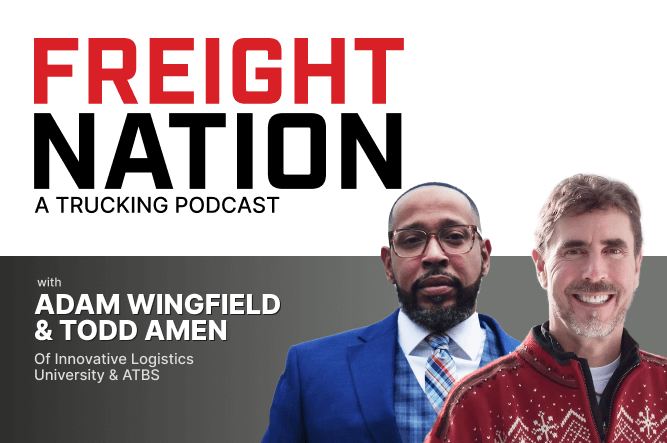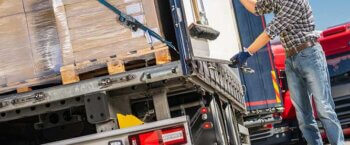Tax Planning Strategies Every Trucker Needs to Know

What are you waiting for?
Find capacity and increase margins starting now.
Tax planning in the trucking industry is anything but straightforward. With unique challenges like fluctuating fuel costs, equipment depreciation, and operational expenses, trucking professionals need specialized advice to maximize savings and stay ahead.
In a recent episode of Freight Nation: A Trucking Podcast, host Brent Hutto brought together two industry veterans, Todd Amen, CEO of American Truck Business Services (ATBS), and Adam Wingfield, founder of Innovative Logistics, to unpack actionable strategies for carriers, owner-operators, and drivers. Their insights not only cover tax planning, but also broader financial and operational tips.
The importance of trucking-specific tax expertise
Trucking isn’t like other businesses, and Todd Amen makes it clear why expertise matters, “Trucking is a really hard business. I grew up in it with my dad, and I learned it is as hard a business as there is to be successful in. And there’s nuances in trucking…insurance is expensive, but I can minimize that cost if I do some really good things. Taxes have very specific laws that relate to truck drivers and taxes.”
Adam agrees and makes a powerful analogy, “There’s a lot of smart people in this world, but I wouldn’t go to a heart surgeon to get a haircut because those things don’t coincide.”
Truckers should prioritize working with tax and financial professionals who specialize in trucking. This ensures not only compliance but also an understanding of industry-specific opportunities, such as deductions and operational efficiencies. A generalist CPA may miss crucial nuances, costing you money.
The 2024 per diem rate: what you need to know
Starting October 1, 2024, the per diem rate for truck drivers increased from $69 to $80 per day. This is a big deal for drivers, potentially adding thousands of dollars in tax deductions. But to claim the deduction, you need to follow the rules. As Todd explains, “To take a per diem deduction, you have to be away from home overnight. The per diem deduction is simply so that you don’t have to keep track of your McDonald’s and your pizzeria receipts on the road; it’s your meals on the road.”
Todd emphasizes how valuable this deduction is, “Per diem deduction is $25,000 a year for the average driver. It’s huge. It saves me $7,000 in taxes. Understand it and get it straight, and make sure your CPA understands how it relates to truckers because this is an exact specific rule written for truckers only. Nobody else gets to do it. Just truckers.”
The per diem deduction is a powerful tool for truck drivers, reducing taxable income significantly. However, compliance is key. Use technology like ELD systems to track days away from home and consult a CPA familiar with trucking-specific tax laws to ensure accuracy.
Using Section 179 for equipment deductions
If you’re upgrading your truck or trailer, Section 179 lets you deduct the full cost of equipment in the year you buy it.
Todd explains how it works, “If it makes sense, I’m going to buy a new truck and take that $60,000 deduction under Section 179 or under bonus depreciation all this year. That’s pretty awesome, right? But it just takes planning.”
But both experts warn against rushing into purchases just for the tax break. Todd cautioned, “Don’t do it for the deduction because that never works out. It has to make business sense for you to do it.”
Adam shares a practical example, “A fuel-efficient truck can cut operational costs as well. Going from five and a half miles a gallon to eight miles a gallon, now I’m saving two and a half miles a gallon. These are the things that you’ve got to make sure that you’re doing.”
Section 179 is a great tool, but it should align with your operational goals. Evaluate the long-term benefits of new equipment, such as fuel efficiency, before making a purchase. Strategic planning ensures you’re not just saving on taxes, but also investing in sustainable growth.
Make technology your best friend
Both Todd and Adam stress the importance of technology in managing finances. It can save time and reduce errors, especially when it comes to tracking expenses.
Todd explains how the ATBS app simplifies things, “Take a picture. If you go to Walmart and buy 200 things, take a picture on the ATBS app of your Walmart receipt. We’re going to go through and figure out what’s tax deductible for you. You don’t have to say this was for the house, this was for the truck. We’ll figure it out.”
Adam urges drivers to embrace these tools, “In 2024, there’s no reason to rely on a shoebox full of receipts. Use technology to focus on what you’re great at, driving and running your business.”
Using apps and digital tools can save you hours of work. Stop juggling receipts and let technology handle the heavy lifting. Automate expense tracking, simplify financial reporting, and improve tax preparation so you can focus on what matters most: the road.
Plan your taxes quarterly
Waiting until tax season to address financials is a costly mistake. Adam and Todd highlight the importance of quarterly tax payments to avoid penalties and maintain consistent cash flow. Todd explains the cost, “If I owe $10,000 to the IRS and I don’t pay quarterly estimated taxes at today’s interest rate with the IRS, they’re going to charge me an $800 penalty. It’s 8%. So get an accountant and get a system that tells you what your actual numbers should be based on what you’re actually earning.”
He also shares a simple rule to stay on track, “Save 20% of your net income and set it aside for taxes every month.”
Regular financial reviews and accurate tax projections are essential to avoid penalties and maintain cash flow. Save 20% of your income for taxes, and work with a CPA who can provide real-time estimates based on your earnings.
Think long-term with retirement
While trucking is tough, planning for retirement shouldn’t be neglected. Todd offers this advice, “Take 10% of every dollar you make and put it in a retirement account. It’s tax-deductible, and it’s going to grow with what it’s invested in.”
Adam reminds listeners of the unpredictable nature of trucking, “Trucking is one of the toughest jobs out there. Anything can happen, from accidents to health issues. Having a financial safety net is critical not just for you, but for your family.”
Retirement planning isn’t just about the future; it’s about peace of mind. Start small by saving 10% of your income and take advantage of tax benefits to secure your financial safety net.
Adapting to Economic Changes
Trucking is a volatile industry, but staying adaptable is key. Adam highlights the importance of building relationships beyond load boards, “Don’t be a one-trick pony. Build that relationship with those one-on-ones that can really help improve your overall bottom line.”
Todd emphasizes how market changes require new strategies, “What you did for the last three years to survive is not how you’re going to thrive and make extra money during the next two years. You’re going to have to change.”
Success in trucking comes down to adaptability. Monitor market trends, diversify revenue streams, and build direct customer relationships to stay ahead of industry shifts.
For more tax planning deduction tips from Todd and Adam, listen to this episode of Freight Nation: A Trucking Podcast on Apple, Spotify, or your favorite podcast platform.
Get helpful content delivered to your inbox.
Sign up today.
Find high-quality loads fast, get higher rates on every haul, and access tools that make your job easier at every turn.






